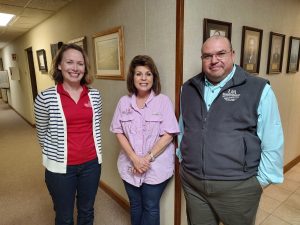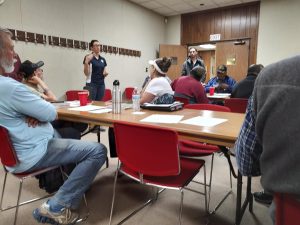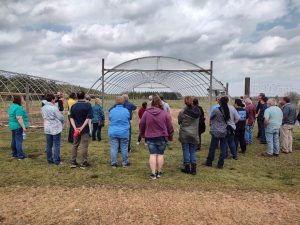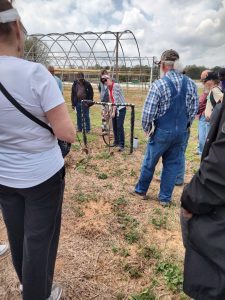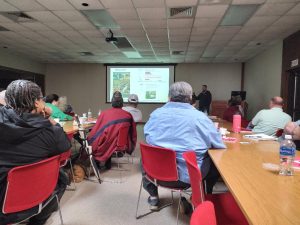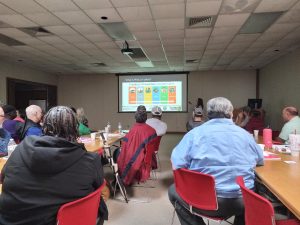Cooperative Extension Service Holds Program on High Tunnel Houses
By Eric Mclaurin, 03/24/23 12:10 PMThe University of Arkansas Cooperative Extension Service held a very informative workshop on High Tunnel Houses on Thursday at the Southwest Research and Extension Center. Kim Rowe, from the Extension Office opened the event, introducing Dr Daniel Rivera, Director of the Southwest Research and Extension Center.
Following Dr. Rivera was Lucas Birriel, District Conservationist with the NRCS, who spoke on the EQUIP High Tunnel program and talked about advantages to high tunnels such as longer growing season, improved quality, weed reduction, energy efficiency and a broader range of potential crops. Birriel also talked about some of the techniques to grow successfully in them including crop rotation, varied species of plants, micro tunnels, water harvesting and sensors. Birriel stated different crops could be grown such as orchids. Techniques taking advantage of the high tunnels included succession planting, intercropping, vertical planting, and pollinator habitat.
Dr. Amanda McWhirt, UA Extension Horticultural Specialist from Little Rock spoke. She works with growers on fruit and vegetable production and which crops to grow and how to grow them inside high tunnels. Dr. McWhirt gave more reasons to grow inside High Tunnels. She stated ] the main reasons were to grow earlier or continue later in the year. She also stated that solely drip irrigating removes rainfall and this reduces disease.
Dr. McWhirt said there were also limitations such as the reduction of heat and light on cloudy days and other pests like it dry. A point she focused on was the length of time to grow crops, sales potential and which crops benefitted the most from growing in a high tunnel. For these reasons, tomatoes and greens are some of the best crops to grow. Tomatoes like the dry weather and lettuce is quick to produce. In contrast, strawberries take a lot of time and care for a short time of production and okra is perfectly happy with the heat and moisture outside. Herbs are high value but limited in sales.
Dr. McWhirt went on to discuss venting the high tunnel as the temperature can spike very rapidly inside. Also discussed were row covers to protect against the cold weather. She stated tall plants could limit air flow and tomatoes grow quickly in this environment and need more fertilization.
While there are advantages to growing in a high tunnel, there are some unique challenges including salt buildup.
The next speaker, Dr. Aaron Cato spoke about what insects affect high tunnels and how to manage them with mites being a particular issue. The importance of what was brought into and kept in the high tunnel in keeping down insects was emphasized.
Sherrie Smith talked about disease management and stated plant diseases don’t move to people. She also talked about the importance of hand washing after touching tobacco products to prevent the spread of tobacco mosaic virus to plants.
Dr. Hannah Wright Smith, who focused on weed management, addressed what organic growers could use (copper and fungicides) and said that organic growing involved growing more crops and spreading them out in order to combat weeds. Dr. Smith stated it was necessary to use a variety of techniques to discourage weed growth as one alone would not work . These techniques include mechanical (pulling), crop rotation, cover cropping, and mulching.
Next Dr. Amanda Philyaw Perez, UA Food Systems and Safety Specialist, talked about how to keep the produce safe to consume with proximity of animals and their waste. The health of harvesters should also be considered. The water used on the crops is also important. Having a good system to wash and clean the produce and tools used also was mentioned.
After Lunch there was a Question and Answer session and a visit to a high tunnel at the Experiment Station.
